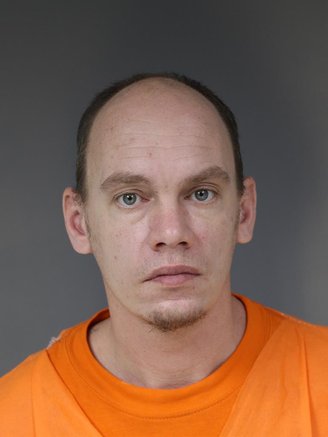Before he went to trial for the July 2015 killing of Khanh Lam, the
prosecution offered William Lamar Hinson III the same deal the jury
eventually gave him: voluntary manslaughter with personal use of a
deadly weapon.
Hinson was convicted Wednesday after a weeks-long trial, with jurors hearing testimony from two witnesses who saw Hinson strike Lam on the head with a board, and a third witness who was “99 percent sure” Hinson was there. But Hinson testified he had left the Garberville town square and didn’t even see the fatal altercation with Lam.

Hinson.
Public Defender Marek Reavis said today he respects the jury’s work, though he’s sorry about their final conclusion.
“After speaking to a couple of jurors and receiving correspondence from another, as well as reading the foreperson’s comments in the Lost Coast, I have a better understanding of why they came to the decision they did,” Reavis said in an e-mail.
“I’m happy that they found Mr. Hinson not guilty of murder, nevertheless, I’m disappointed for Mr. Hinson; the jury didn’t believe his testimony that he didn’t participate in the fracas that led to Mr. Lam’s death. It was a hard case in many respects for the defense — asking the jury to discount the testimony of three eyewitnesses. The jury’s verdict is their opinion as to what they believed happened; Mr. Hinson’s story wasn’t enough to convince them that he was not there.”
During an interview after the verdict was announced, the jury foreman said “a handful” of jurors started deliberations believing Hinson was guilty of murder. On the other hand, some jurors initially had doubts about whether Hinson, as he claimed, was even on the scene.
The eyewitnesses provided conflicting and sometimes erroneous testimony about the facts. But both Reginald “Green Man” Newlin and Kenneth “Kenny” Hunt were sure Hinson was the person who hit Lam over the head. He died from massive brain injuries.
The prison term for voluntary manslaughter is three, six or 11 years, plus one consecutive year for personal use of a deadly weapon.
Deputy District Attorney Roger Rees, who prosecuted Hinson, said he appreciates the time and work the jury put into the case “and I think they reached an appropriate verdict.”
Rees said his office had offered Hinson an “open plea” to voluntary manslaughter, meaning there would be no agreed-upon sentence and the judge would choose the term. However the deal hinged on Hinson admitting the allegation of personal use of a deadly weapon, so essentially he would be admitting to committing the crime.
Hinson’s case has been referred to the Probation Department, where an officer will interview him and make a recommendation on the appropriate sentence.
Hinson, 41, is scheduled for sentencing April 8 by Judge Larry Killoran, who presided over the trial. He will have to serve 85 percent of the sentence imposed. He has been in custody since Nov. 4, 2016, when the U.S. Marshal’s Office arrested him on a warrant at his father’s home in Florida.
Hinson testified he lived with his father, a retired deputy sheriff, except when he worked at marijuana farms in Southern Humboldt from May to September. The year 2015 was the fifth year he had traveled to Humboldt to work on grows.
###
PREVIOUSLY
- Man Brain Dead After Reported Altercation in Garberville; Sheriff’s Office Investigating
- Last Week’s ‘Falling’ Death in Garberville Now Considered a Homicide
- One Arrested in Connection With Last Year’s Saturday Afternoon Homicide in Downtown Garberville
- Man Accused of 2015 Garberville Killing Appears in Court After Being Extradited From Florida; Man Formerly Accused of the Murder Released
- Preliminary Hearing Scheduled for Man Suspected of 2015 Garberville Murder
- Over Two Years Later, Suspect to Stand Trial on Charges of Beating Georgia Man to Death in Downtown Garberville
- Witness to 2015 Downtown Garberville Murder Testifies That Victim Attempted to Kidnap Girl From a Van
- Two Witnesses to 2015 Garberville Murder Provide Conflicting Testimonies
- Eyewitness to Garberville Killing Says Higher Power Has Forgiven Suspect; Testimony Suspended Until Wednesday
- SoHum Murder Victim Had ‘Potentially Toxic’ Levels of Meth in His System, Pathologist Says
- Main Suspect in Garberville Murder Adamantly Denies Beating Victim With Board, Says He Fled Scene in Fear Before Killing Took Place
- SoHum Murder Suspect’s Story Changes as Testimony Wraps Up; Psychologist Says Memory Can be Faulty
- Juror in Hinson Murder Case Quits to Get Back to Work; Deliberations Begin All Over Again With Alternate
- Jury Acquits Hinson of Murder; Voluntary Manslaughter Conviction Could Amount to Anything From Small Sentence to 12 Years
CLICK TO MANAGE